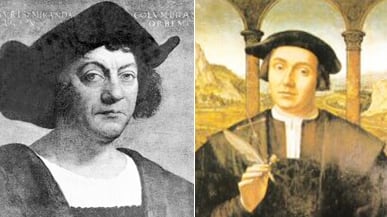“The land was... full of trees of endless varieties, so high they seemed to touch the sky... and as green and lovely [in November] as in Spain during May... The nightingale and other small birds of a thousand kinds were singing... [The natives] showed so much love they would have given their very hearts... I forbade my men to give them worthless things [in exchange for valuable things]... It seemed wrong to me...”

Thus rhapsodized Christopher Columbus to the courtier Luis de Santangel, in the first written report of his discoveries, from the Canary Islands in February, 1493. King Ferdinand and Queen Isabella learned of the Genoese explorer's success not from his own pen, but from the mouth of Santangel.
Why would Columbus first report to a servant of their court, rather than to the sovereigns themselves? He was far too astute to insult his most powerful benefactors. Some historians hypothesize that Columbus wrote either first or simultaneously to the sovereigns, but that letter was subsequently lost. How, though, could the royal court, with its scribes and copyists and culture of security, have misplaced such a monumental document?
Whatever the outcome of this debate, it is clear that Columbus felt a strong personal debt to Santangel. Rightfully so; Luis de Santangel had not only arranged the financing for Columbus's voyage, he had convinced the queen to place her imprimatur upon it, despite the opposition of the most learned minds in her court.
The objection of prominent scholars including Hernando de Talavera was simple: Columbus vastly underestimated the circumference of the terrestrial sphere, and thus the distance from Europe to Asia. These naysayers were right. No 15th-century ship could have stored enough fresh water and food for the long voyage between Spain and Japan, had a continent not lain between. Only after Queen Isabella dismissed Columbus, with apparent finality, did Luis de Santangel so bravely intervene. It is as if, in today's world, the president's chief fundraiser overcame the objections of NASA scientists regarding the feasibility of a manned mission to Mars.
Why would a savvy courtier take such a risk? Why would the queen yield to his pressure? After all, Santangel was a financier, not a scholar or cartographer; presumably, he knew little about the merit, or lack thereof, in Columbus's plan. What do we know about Luis de Santangel? The answer is: precious little. What we do know, though, is intriguing.
The Santangel family was one of the wealthiest in King Ferdinand's realm of Aragon. They dominated the wool trade, tax collection, law, and banking. In 1481, King Ferdinand named Luis de Santangel escribano de racion, placing him in charge of royal finances.
We also know that Santangel's family were conversos. That is, they were descended from Jews who had been converted to Christianity, probably by force during the waves of anti-semitic rioting that swept Spain at the end of the 14th century and in the first part of the 15th century. Conversos kept company with each other, married into each other's families, and were reputed to hold themselves apart from the larger Christian community. To be a wealthy, prominent converso in 15th-century Spain was to be despised and viewed with suspicion. Peasants envied their access to power; cash-strapped aristocrats, their liquid wealth.
The Spanish inquisition persecuted many members of the Santangel clan, including apparently Luis de Santangel's son and cousin. Following the murder of the first Chief Inquisitor of Saragossa in 1486, suspicion fell on a number of conversos, including the escribano de racion himself. Had the king not personally intervened, Columbus's sponsor might well have met his end at the hands of the inquisition. Christopher Columbus would not have sailed from the shores of Spain and might never have discovered the New World.
Conversos were an easy target for the Spanish inquisition, who had financial and other incentives to convict as many “judaizers” as possible. It may well be that a large number of sincere Christians were burned at the stake. However, it cannot be denied that at least some conversos secretly passed Jewish customs to their descendents. To this day, heirs of these so-called “marranos” light candles on Friday night without knowing why, only that it is a family tradition.
Meanwhile, for the unconverted Jews of Spain, things degenerated from bad to worse. In the first state-sponsored ethnic cleansing of modern history, Queen Isabella and King Ferdinand ordered all Jews to depart from their kingdoms, leaving their possessions behind, by July 31, 1492. Christopher Columbus set sail three days after this deadline. (There is a legend, impossible to verify, that Columbus ordered the doors of his ships sealed the night prior to his departure, preventing agents of the santa hermandad, who fulfilled the function of state police, from boarding to check that no Jews were sailing with him.) We know that Luis de Santangel, together with other high-ranking conversos, discreetly helped finance the safe departure of a group of Jews from the port of Cartagena.
Some things never change. The competition between civilizations engenders ethnic and religious conflict. Out of the suffering spring brazen passion and hope. Ezekiel did not conjure his visionary prophecies from the comfort of a royal palace in Jerusalem, but from exile and despair in the land of the Chaldeans. Isaiah's inspired discourses followed the invasion of Israel by the Assyrians in the eighth century, BC. Throughout western history, great visionaries including Dante and Blake poetized from the margins of mainstream culture.
Perhaps Luis de Santangel was another such visionary, and the discovery of the New World, in the context of 15th-century religious strife, just such a prophetic poem. Perhaps it could have occurred in a perfectly calm world, or sprung from rational minds, but that is not the way it happened. The world was anything but calm; the rational minds, anything but supportive. Destiny yoked together a brilliant navigator and a tortured, desperate financier. The rest, as they say, is history.
Plus: Check out Book Beast, for more news on hot titles and authors and excerpts from the latest books.
Mitchell Kaplan is the author of By Fire, By Water, now available from Other Press.





